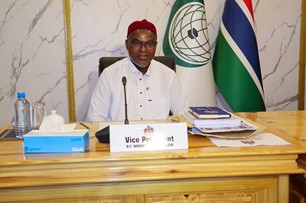
This report provides evidence for increased investment in mental health services to address the country's rising mental health crisis. It also highlights the economic and social costs of mental health conditions and proposes strategies for strengthening mental healthcare programs and services.
In his launch statement, VP Jallow acknowledged that it has been hidden behind stigma, whispered about instead of understood.
“Yet, mental health is not a distant issue. It is close - it is personal. Every family knows someone who has struggled, even if we do not always speak their name. The truth is simple — there is no shame in mental illness.”
The vice president maintained that the mind, like any other part of the body, can need healing, saying that when someone seeks help for depression or trauma, it should be treated with the same compassion and urgency as a broken limb or malaria.
“We cannot accept a reality where those in mental distress are left to face it alone.” he added.
Thus, he highlighted the need for transformation regarding ‘how we think about mental health — from something to be feared or hidden, to something we talk about openly, address with compassion, and resource with the same urgency as any other health condition.’
VP Jallow maintained: “We cannot build The Gambia we aspire to - a just, prosperous, and peaceful nation - if our people are weighed down by distress, trauma, or hopelessness.”
That, he added, is the reason mental health is not only a medical concern; rather it is a national development priority, a human rights issue, and a moral duty.
“Poor mental health leads to lost income, broken families, and lower productivity. It affects education, employment, and national cohesion,” he said.
He made reference to the fact that when a young person’s potential is lost to untreated depression or substance misuse, the nation loses part of its future.
He further said: “When trauma goes unaddressed, it can echo across generations. This is why mental health must be embedded in all sectors — from education to justice, agriculture to finance. A teacher must understand the emotional needs of students. Police officers and judges must respond with empathy to those in crisis.”
In light of this, he highlighted the need for community and religious leaders to help end stigma and promote understanding.
“In this effort, every ministry has a role, every partner has a responsibility, and every Gambian has a stake. Our government, under the leadership of His Excellency President Adama Barrow, is committed to ensuring that mental health is not left behind in our journey toward universal health coverage.”
Dr Ahmad Lamin Samateh, Minister for Health, acknowledged that the move is a not just a milestone but a turning point in “our collective journey towards a healthier, more inclusive and more compassionate Gambia”.
The Government of The Gambia, the health minister went on, recognises mental health as a public health priority and this commitment is even reflected in the National Mental Health Policy 2025 – 2035, as well as the Finalization of the Draft Mental Health Bill which aligns fully with the National Development Goals and the Health Sector Strategic Plan.
Minister Samateh described mental health as a critical component of overall health and wellbeing, pointing out that The Gambia Mental Health Investment Case seeks to strengthen mental health care programmes and clinical services through accessible and cost-effective and culturally appropriate measures.
The report, he further added, also provides evidence needed to act decisively and boldly such that investing in mental health is not only a moral imperative, but also economically and socially sound and essential in attaining universal health coverage.
The event was graced by cabinet ministers, the diplomatic community, senior government officials and staff of the Ministry of Health.
Read Other Articles In Headlines





